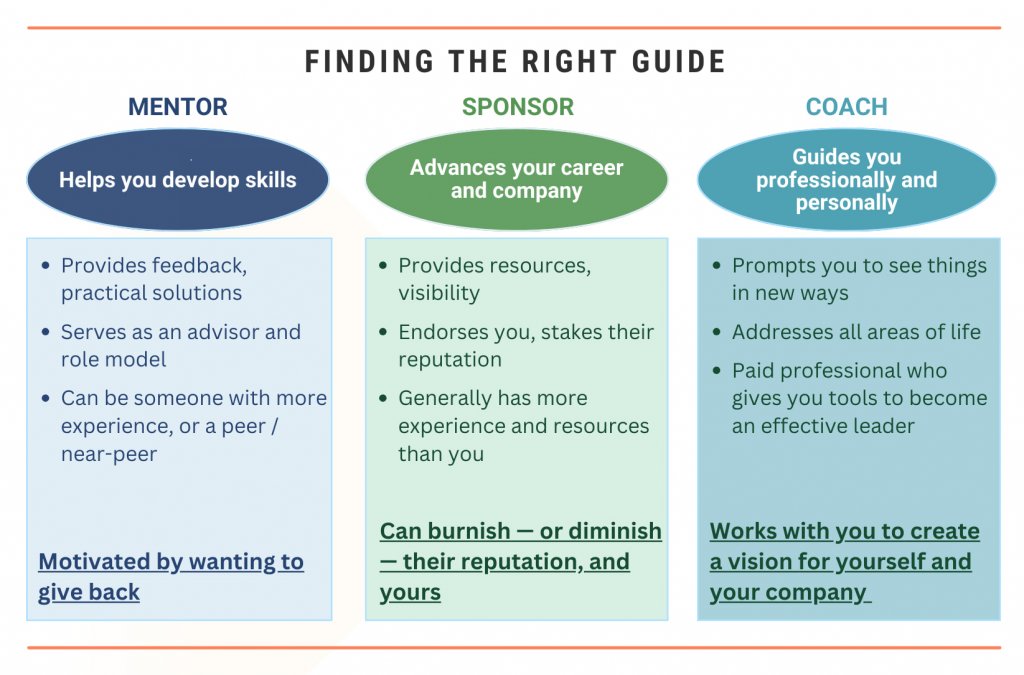Mentors. Everyone wants one, and few have good ones. Knowing what to look for can save you time and frustration.
Mentors have mentees, and sponsors have protegees. Both can help you, but with your sponsor, your job is to make them look good in exchange for endorsements and opening doors to investors, clients and others. By contrast, a mentor is there mainly to give you advice and to serve as a role model.
Mentor/mentee relationships can turn into something more, with the mentor offering access to her network and capital. But don’t go into it expecting that. If you do, you may be disappointed.
Your sponsor is staking her reputation on you, the protegee, and it’s up to you to deliver results in exchange for getting social and/or financial capital. She’s taking more risks than a mentor, and you could burnish – or diminish – her reputation depending on whether you validate her confidence in you.
A coach, unlike a mentor or a sponsor, is a paid professional who helps you see your challenges in new ways. When you work with a coach, you’ll create a vision for yourself and for your company. (I am a certified coach and work with founders on all aspects of the founder journey.)
Money matters, but networks matter even more
Networks drive the early-stage funding world. For young companies, especially before they have revenue and growth, the most valuable assets are reputation and potential. When a mentor or sponsor supports you, she’s signaling trust in your abilities, leadership potential, drive and integrity, which is key to unlocking investor networks and other resources.
But remember what aiding you costs the mentor or sponsor. She’s giving up her time and going beyond that by recommending you to potential investors. This reflects on her judgment.
If you are a founder, make this easy for her by demonstrating that you:
- Follow through consistently
- Know how to tell the story of why you are investable and will deliver returns
- Do your homework on people/groups to whom you want intros, including ghost-writing intro notes she can send on your behalf
Be clear about what you need and want
If you’re not getting what you want from meeting with someone you want as a sponsor, whether that’s money or connections, ask why. The person you’re meeting with may not realize you want her sponsorship. Maybe she likes what you do but isn’t ready to stake her money or reputation. It’s up to you to find out.
I’ve been on the other side of this dynamic, meeting with founders who update me on their businesses, but who don’t ask for money or intros. That’s fine, but a couple of times, I only discovered what they wanted after the fact and felt bad about not having been more helpful. Look for a clear yes or no to what you want, and if you hear “maybe,” take it as a polite no.
Here’s an example of a request I got from a mentee:
Thank you for your ongoing support of me and my company. We are at the exciting intersection of women’s health, sustainability and profitable social justice.
Would you be interested in investing? You have been so key in helping us get to this point! We have a compelling shot on goal on this being our last round and terrific tailwinds behind us. We are particularly committed to including diverse and female investors on the cap table.
That’s it. Clear and convincing.
As I’d gotten to know the founder, most of our conversations were about how she dealt with challenges. That willingness to share the difficult times was a big part of why I and many others had huge confidence in her and invested.
Mindset matters
The founder who wrote the e-mail above could make a compelling request because – other than being super-smart – she was confident she was offering a great investment. Over many months, as she grew her network, she actively sought specific feedback on how to position her company as an attractive investment.
Don’t feel like you have to paint a rosy picture. In fact, the opposite is true: bring up the challenges and how you’re tackling them. That’s a good way to gain credibility with investors.
Here are the key things to remember:
- Sponsors provide access to their networks, investors and capital. It’s up to you to make a convincing case about yourself and your company. Then you can deliver results that the sponsor cares about.
- Mentors can do a lot to help you grow your business too, but they’re mainly there for advice and guidance.
- Build a team of mentors and sponsors. Each serves a different purpose at different times.
- Neither the mentor nor the sponsor is a shoulder to cry on. Save that for your coach.
- Your coach cares about you as a person and wants to hear about all aspects of your life.
- Whether you’re a mentee, a protege or getting coaching, you need to drive the relationship.
Embrace all types of mentoring. It takes effort to build these relationships, and all are needed.
About the author
Lisa Frusztajer spent most of her career in technology, contributing to building products and organizations. Frusztajer is a certified coach who works with female founders and executives to help them become effective leaders. She advocates for a more equitable distribution of capital and opportunity.








Add Comment